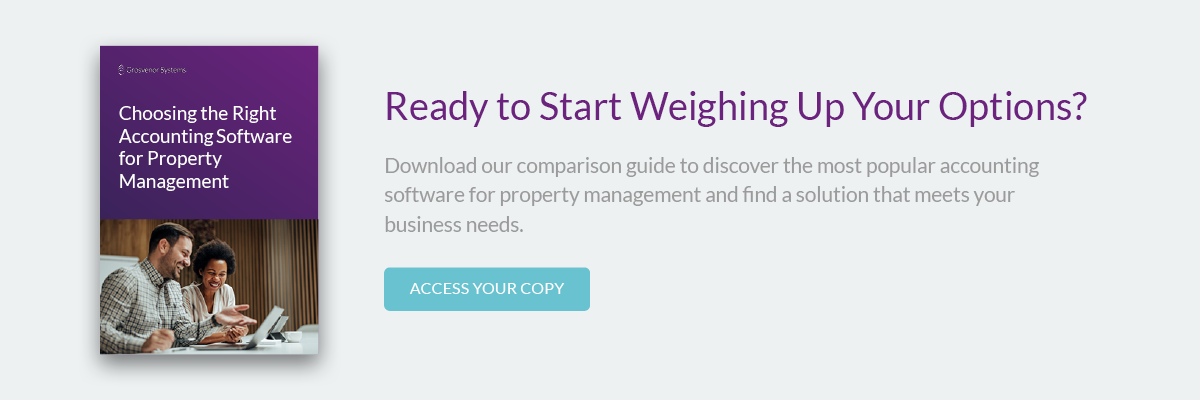A Comprehensive Guide to Property Management Accounting
Property management accounting covers how you record income and costs, manage service charge accounts, and produce accurate financial reports for clients and stakeholders. This guide explains the core processes UK property managers rely on plus the software features that help reduce manual work and improve control.

On the other side of the coin, you also have your everyday duties to carry out. This might include staying on top of arrears in your fast-growing portfolio and managing other areas such as cashflow. You also need reliable data at your disposal. However, a recent study found that accountants worldwide are losing an hour a day having to manually check their data for errors.
Of course, having the right software in place is crucial. But there are also some best practices and areas you should focus on in the future to give you and your business the best chance of success.
We’ve covered everything you need to know in this article.
Best Practices for Property Management Accounting
Time is of the essence in the world of property management. You work in a deadline-focused environment and as your business grows, so does your property portfolio and list of jobs to do.
Much of the time, you’re relying on data. And when you find yourself working with bad data, it causes headaches and can ultimately impact efficiency and profitability.
In addition, you find yourself in a world where jargon is the norm. Property management accounting is a comprehensive topic with a unique lexicon of terms. Keeping up to date with these terms is crucial to doing your job properly, but that can be difficult when clients become increasingly demanding.
So, I thought it’s worth highlighting some of the most important property management accounting terms you need to keep on your radar.
The Top Accounting Terms to Know About
Accounts Payable
Accounts payable (AP) is a short-term debt and a liability your business owes to its vendors/suppliers that have provided the company with goods or services on credit.
Bookkeeping
This is essentially business accounting and includes the process of recording business transactions that give you your accounting information. The right software is also crucial for managing this function.
Chargeback
Chargebacks occur when you spend money on a property and the cost is a tenant's responsibility. This may also be referred to as expense recovery that needs reimbursing to your business.
Depreciation
This is when an asset, typically a property in your line of work, decreases over time due to use or obsolescence.
General Ledger
Your general ledger is a complete record of all your business transactions. You must choose the right property management accounting software to have an accurate picture. We’ll discuss your options later on.
Financial Statements
A financial statement in property management is a report made of different areas that provide information on the financial health of your business. This may include a balance sheet, profit & loss or income statement.
Operating Costs
These are the costs associated with the maintenance and administration of your properties on a day-to-day basis. Having the right software in place can make keeping up with these costs much easier.
These are just a few of the terms to know about as an accountant in property management.
Tips for Accountants Working in Property Management
We know you have a lot on your plate. On top of working to tight deadlines, you also need to retain your best staff and create a culture that encourages your best talent to stay.
With this in mind, here are some helpful property management accounting tips you can share with them (and also use yourself).
Create a Process Guide Detailing Your Property’s Accounting Practices
Recent findings suggest that upskilling employees to maximise output is one of the biggest challenges for accountants. Businesses can overcome this by creating a detailed guide outlining their accounting best practices.
This guide should provide a roadmap that anyone in your project management team can follow. It should include everything you’d usually complete during a transaction cycle.
It may also run through the most effective accounting methods you follow during projects and guide people on using the property management software you have in place.
Use a Property Management Budget Planning Schedule
Managing budgets is a big part of your role and requires a lot of planning. To help you along the way, it’s always worth creating a budget planning schedule.
This schedule will make it easier for you and your team to prioritise specific jobs, including obtaining necessary approvals, gathering previous financial statements and prioritising debt repayments.
We’ve provided more tips on achieving effective property management budget planning. You can learn more about them here.
Benchmark Your Operating Expenses
Inaccurate data is your biggest enemy. However, data without any context also offers limited value to your business. To identify areas for improvement and ensure your expenses are in a good place, measure them against competitor portfolios.
Having a relevant point of comparison can help accountants working in property management control costs and justify certain property expenses to stay competitive.
You can leverage third-party data sources to stay in the know, including IREM/Expense Analysis.
Stay Ahead of the Pack By Predicting Tenant Trends
Like every industry, the behaviour of your customer base is likely to change regularly. For example, houses remain in short supply, but there’s an ever-increasing demand for this property type.
Given how quickly tenants’ needs and behaviours change, we recommend you do your best to stay updated on current trends. Of course, speaking to them and gathering feedback is one way to do this.
Use Technology to Automate Slow Processes and Work From a Single Source of Truth
In years gone by, accountants had to spend time jumbling through cluttered spreadsheets or paper files to complete jobs such as budget planning and forecasting.
Nowadays, a range of property management accounting software can support you with these tasks and provide you with clear and accurate data. Read on to get the roundup on your options and which solution is right for you and your business.
So, you now have a roundup of some of the best practices you and your team should follow — let's take a look at some of the most effective ways to manage your service charges.
Service charge accounting and compliance basics
Accounting for service charges in the property industry is a specialist area that requires expertise. It can be time-consuming and it’s essential to accurately account for block management finances to manage buildings effectively.
As a best practice, service charges should be collected annually in advance so calculations for the costs are estimated for the year ahead. Generally speaking, these costs can be split into three different categories.
Block management companies must take several regulations into account to ensure their actions meet the best practice guidelines when managing service charge accounts. Some you should consider are:
- Money paid by leaseholders to contribute to service charges should be regarded as trust money and should therefore be held in designated bank accounts.
- Block managers don’t need individual bank accounts for each property unless the lease specifically requires one.
- Funds for each flat or apartment in the block must be easily identifiable so they should be kept separately. Block managers will breach trust if service charges from one property contribute toward paying the costs of another.
- If a lease or tenancy agreement specifically depicts how service charges should be presented in an account statement; what costs can be claimed and states a time in which the service charge accounts should be prepared, these requirements must be met.
Want to know more about managing service charges? We’ve got you covered. Check out this article we’ve written that discusses the legal requirements in more detail and frameworks to follow.
Having the right accounting software is crucial for your operation. Read on to gain some advice on what to look out for when you’re choosing the right software for your business.
Choosing property management accounting software
Not only does property management accounting software automate much of the repetitive, manual work — it also provides new opportunities to grow your business and continue to delight your customers.
All of this sounds great, but for many accountants, choosing an accounting software solution that’s right for them can be tricky. This is mainly because there are so many options available.
There are three main options to choose from when choosing accounting software; consolidated accounting software, standalone commercial solutions or spreadsheets.
The obvious choice for many accountants is to select a standalone accounting solution. These include the likes of QuickBooks or Xero. Of course, these solutions are great. They provide you with all the tools you need to manage your accounting.
However, other options on the market are specifically designed to support accountants working in property management. With these solutions, you can easily manage your entire portfolio from anywhere.
On top of offering comprehensive accounting functionality, these solutions can also update in real-time and support you with tasks such as purchase orders, financial budgeting and managing arrears.
What’s even better is that they can seamlessly integrate with other software used in your operation. This provides complete business visibility and ensures you and your team work from a single source of truth. The results will speak for themselves with more reliable data and better decision-making.
Related Content
- What is property management accounting?
- How property accounting software can elevate accountancy
- Maximising efficiency for property managers
- Mastering financial control in property management
Ready to Start Comparing Your Options?
Get the comparison guide covering features that matter day-to-day: service charge workflows, client reporting, data accuracy and auditability.
Now is the time to find a solution to help your business grow and make your life easier. Download your copy of the guide below.
.png?width=1920&height=941&name=GS%20white%20clear%20(Large).png)

